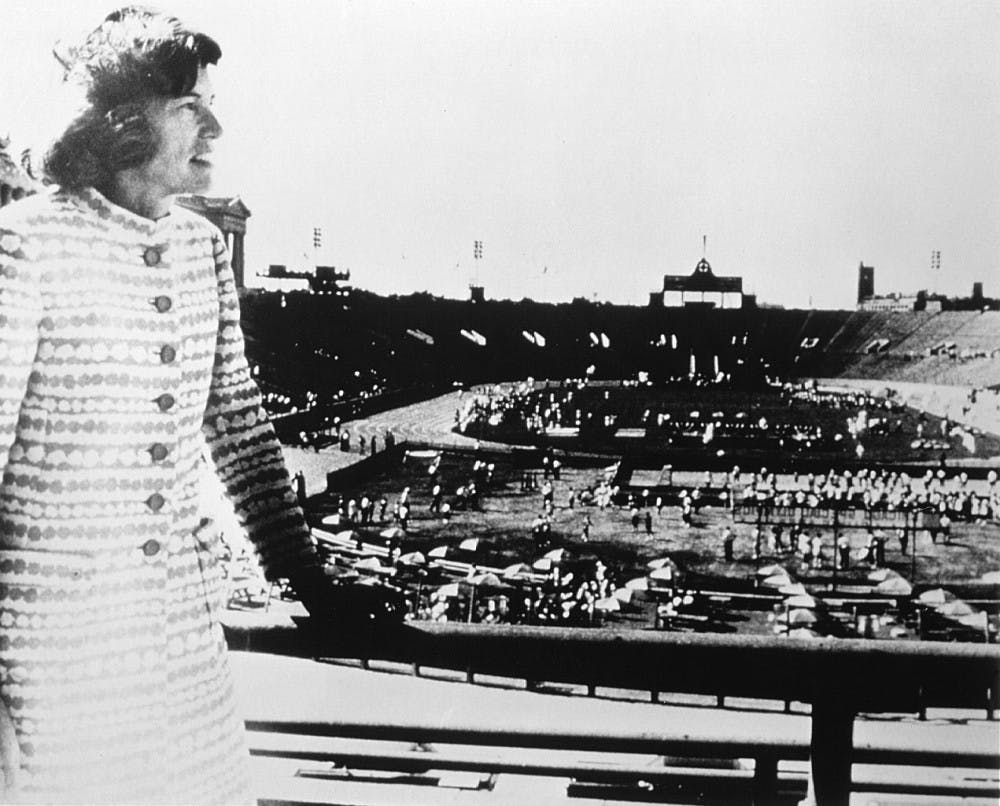Special Olympics Michigan: Building a dynasty, celebrating nearly half a century in Mount Pleasant
For Michigan adults and children with disabilities, the statewide Special Olympics Summer Games are one of the few chances they’ll have at showing the world – and themselves – exactly what they’re made of.
Living with a disability day to day can be a bigger challenge than most people could ever fathom, whether those challenges take the form of physical impairments or social isolation from their peers.
No one knew that more than Eunice Kennedy Shriver, sister of slain American President John F. Kennedy.
Shriver’s other sibling, Rose Kennedy, lived with a cognitive disability. As she grew up with Rose, Shriver watched as others excluded and isolated her from social, leisure and other sporting activities.
In a response to her sister’s plight, and to ensure that people living with disabilities everywhere would be judged only by the content of their character, Shriver started the first Special Olympics in 1968.
More than 40 years later, the Michigan arm of the Special Olympics brand is set to host a record-setting 2,829 athletes at the 2014 summer games at Central Michigan University.
The games will also host about 3,400 coaches, volunteers, family members and will even feature an appearance by former “American Idol” contestant and Mount Pleasant native Shubha Vedula.
Public Relations Coordinator Aaron Mills said it is the most athletes who have signed up for the games in the last eight years.
“I don’t know what to attribute to that,” Mills said. “We just have more people coming out to do it. We’ve seen an increase in the number of athletes, and we’re all about it.”
The three-day event will start on May 29 when the runners in the Law Enforcement Torch Run take the torch that signifies the start of the games at 10 a.m. from Lansing to Kelly/Shorts Stadium, where it will arrive 6:30 p.m.
Vedula will sing the National Anthem at the beginning of the games, along with other songs. She will also be signing autographs on May 30 with David Paquette, last year’s SpartanNash Stores 2013 Healthy Athlete of the Year.
From Friday on, sporting activities will be on display around CMU’s campus, such as the Unified Soccer Clinic, the rowing challenge competition and Drop-in Zumba. Most of the events will take place at the stadium, the Indoor Activities Center’s Turf Bay, and the outdoor and indoor IAC track.
Heather Burke, SOMI’s director of sport and training, said the summer games will feature 96 total events, including two new clinics for indoor kayaking and tennis.
“There are 13 different sport events to a degree, not including field events,” she said. “We’re also having a Project Unify day on Thursday, which will include bocce ball, bowling and soccer.”
The Project Unify program is designed for K-12 students to partner with students with cognitive disabilities, Burke added.
Other than its service to families and people with disabilities, the Michigan summer games also is known as one of the largest volunteer venues out of any CMU event.
Zachary Warner, SOMI’s coordinator of sports and training, said the games will have roughly 98o volunteers signed up to help move the event along smoothly. However, Some of those slots are from groups like SpartanNash – the sponsor of the event – which brings in 15 to 25 volunteers, moving that number to more than 1,000 volunteers this year.
“The oldest volunteer is 79 years old, the youngest one is seven years old,” Warner said, speaking about the diversity of the kinds of people that volunteer each year.
A lifetime in Michigan
While the first event began in the ’60s, Michigan was one of the orginization’s founding delegations. Michigan formed its statewide Special Olympics competition within the first year of the games’ existence.
Originally hosted in Kalamazoo at Western Michigan University, the organization’s state headquarters was founded in Adrian. In 1973, the state summer games moved up north to CMU, where it has called home ever since. It’s statewide headquarters followed suit a year later.
The first summer games had 1,600 athletes and more than 200 volunteers, all of which were CMU students. That number has grown exponentially, and volunteers now include not only CMU students, but athletic coaches and local medical staff.
Special Olympics Michigan needed to settle into a different place other than Adrian with the necessary resources and an enthusiastic community, Mills said. Mount Pleasant left such a good impression after the games were held here for the first time that the organizers decided the town was indeed the best option for a new home.
Mills added that it was a big deal back then for Mount Pleasant to get the games because it was the fourth ever city to host the International Special Olympics summer games. Other international games were located in cities like Chicago, Los Angeles and New York.
“(They) were the first cities to ever hold the International Special Olympics Summer Games, which is crazy when you think about it,” Mills said. “That involved athletes from all over the world coming to Mount Pleasant.”
With the advent of social media, the Michigan summer games have a new global appeal, reaching far outside the confines of the Great Lakes. According to recent Facebook trends, Mills said, SOMI has the second most “likes” than any state program for Special Olympics in the country.
“We’re just shy of 14,000, which is solid,” he said. “A lot of it is word of mouth at this point. The more people know about what’s going on with SOM, the more they’ll want to have us in their Facebook and Twitter feeds.”
Like the athletes who compete, the games in Mount Pleasant have truly lived up to the challenge, and continue to show the world exactly what it’s made of.




